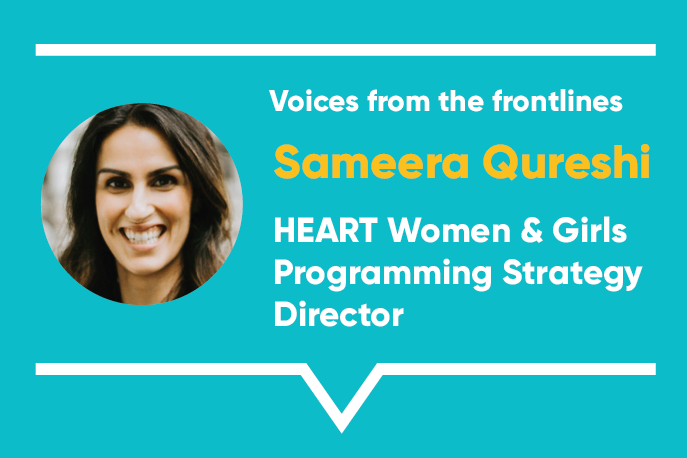We recently spoke to Sameera Qureshi, Programming Strategy Director at HEART Women and Girls, a non-profit committed to sexual health education and sexual violence prevention within Muslim communities. Sameera, who moonlights as a yoga teacher, is passionate about supporting Muslim survivors and the communities and professionals who serve them. Sameera discusses the unique needs and experiences of Muslim survivors and the challenges of observing Ramadan during the pandemic. She also shares how her faith and experience as a survivor motivates her. This interview has been edited for clarity and length.
Based on your experience, what are some of the unique needs and experiences of Muslim survivors and communities?
Muslims have intersectional identities, and faith is one part of it. This often puts us at a disadvantage from many angles as we face stereotypes and discrimination based on religion, race, age, gender, etc. Even within the Muslim community, people are marginalized based on color and other factors, for example: Black Muslims or Muslims who identify as LGBTQ+. Then there is this additional spiritual layer because our community at times spiritually shames and abuses survivors, through victim-blaming messages and misinformed expectations related to modesty and sexuality, which completely ignores the root cause of sexual violence, being power and control. In addition, female survivors, especially those who have experienced Islamophobia, mistreatment, and discrimination based on their faith, are often afraid to disclose sexual assault out of fear that they’re outing someone in their own community if the person who harmed them is also Muslim.
Imagine the challenge we face when most cultural or religious sensitivity trainings apply an “Islam 101” framework that only scratches the surface of how a survivor’s faith intersects with their experience when what is really needed is catering to each survivor as an individual. While many professionals and advocates are eager to learn more about how to support Muslim survivors, doing so using a homogenous “this is what Islam is and what a Muslim survivor needs” one-size-fits-all approach does not do any justice to the vast diversity of Muslim survivors.
We’ve heard a lot about how COVID-19 has exposed the inequities that already existed before the pandemic, particularly for communities of color and other historically disadvantaged populations. How have you seen coronavirus impact Muslim women and girls?
Before the pandemic, there was already a lack of safe spaces for Muslim survivors to seek healing and community. Ramadan – an important month of fasting, spirituality, and community – also began shortly after the COVID-19 outbreak. Many survivors may feel stuck where they are. They’re not able to travel to see family for Ramadan, which would have been a source of support. Others may not want to be with their family who don’t know about their survivorship. There’s also the pressure of Ramadan being incredibly holy, which could bring additional stress for a Muslim survivor who’s already struggling with how to reconcile being a survivor with being Muslim and understanding Islam. There are many ways this could look like, including survivors feeling pressured to pray away their trauma, not being held with compassion when they struggle with their faith as a result of being spiritually abused, or experiencing guilt from the community to forgive their perpetrator. These are all difficult emotions that survivors grapple with on top of trying to heal from their abuse.
With social distancing, how is HEART continuing to support Muslim survivors?
We have shifted our work to be entirely online and are focusing on self-care and compassion. One of the first things we did was release three virtual Iftars this month – which means breaking of the fast. Led by our team, these are a safe space for Muslim survivors to just reflect and find tranquility.
We’ve also been able to reach people who wouldn’t be able to come to our in-person programs. So our following has actually grown since COVID started. For example, we’ve done many webinars for professionals who serve Muslims and want to be involved in the movement to end sexual violence.
How are you personally coping with COVID-19?
It’s been a combination of physical and spiritual practice for me. I have been doing a lot of reading and spiritual meditation on a daily basis. Yoga has always helped with that, even when I’m teaching yoga online and also just doing my own practice at home. I’ve also been journaling and keeping in touch and reconnecting with family and friends back home, which has been really helpful.
Despite the pandemic, we’re seeing communities come together and individuals step up to help others. What ‘silver linings’ have you seen?
I’m really hopeful about the innovation and creativity that has been happening on the fly during COVID. I don’t just mean with HEART. I’m seeing other organizations respond rapidly to the changing situation and are shifting their resources in a way that’s allowing them to meet the needs of their community.
In these tough and uncertain times, what motivates you to keep doing this work?
It comes back to a religious teaching in Islam that there is a responsibility for us as Muslims to lift the burden off of other peoples’ shoulders when we can. I also identify as a survivor, which informs my understanding of why I do this work and keeps me grounded and humble.

